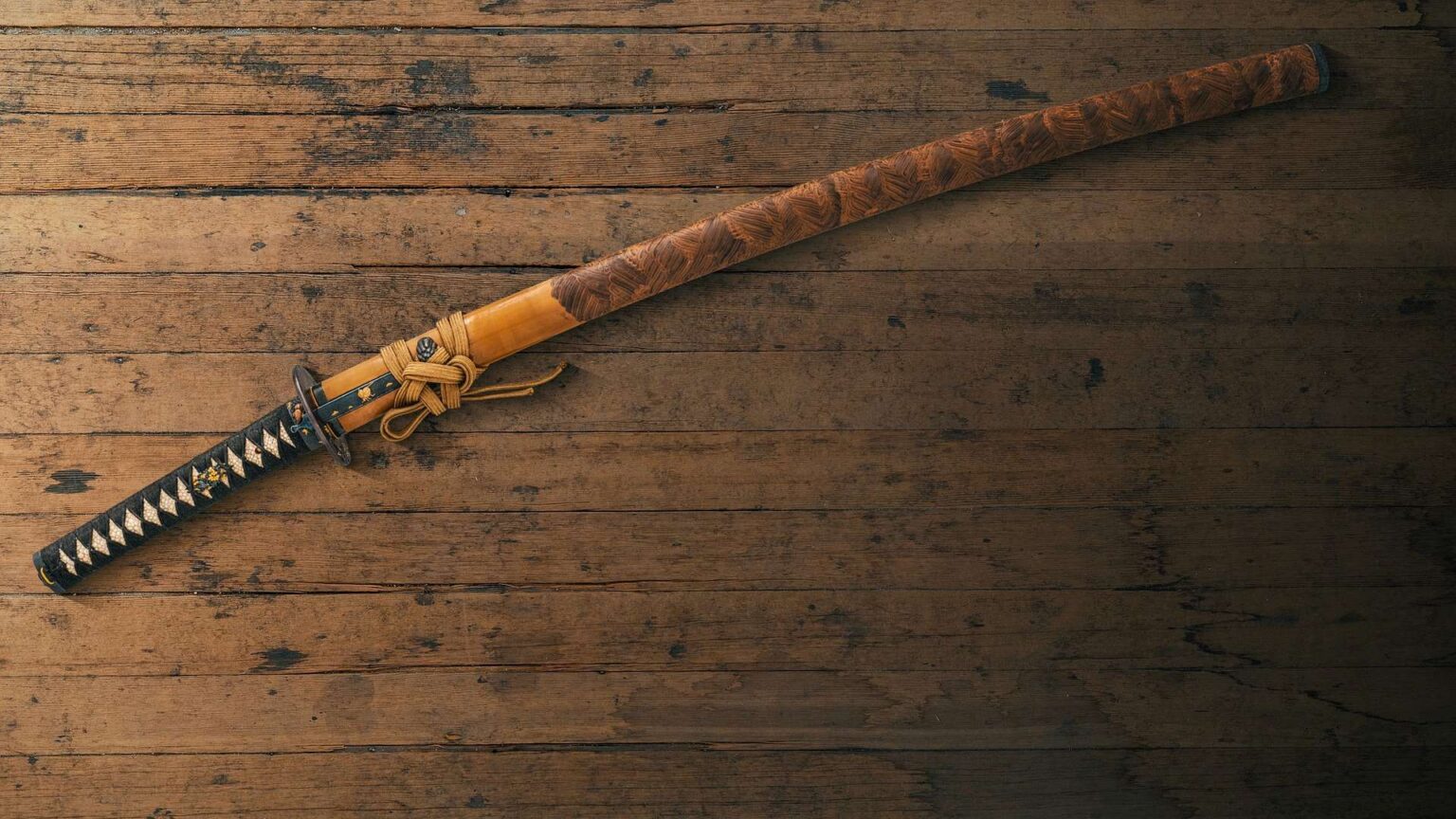
Disclaimer: This article is a guide with personal opinions and observations regarding UK law on swords, and should not be taken as legal advice. If you are unsure about owning any kind of sword or weapon, seek proper legal services.
Quick selection
The appeal of samurai swords
Samurai sword law
What this means
Checks and procedures
Other considerations
The appeal of samurai swords
Whether it’s the drama of samurai movies and games, or their historical significance and design; the appeal of owning a Japanese sword of your own (referred to as samurai swords) is a fairly common desire — albeit fleetingly for many of us. For those who remain excitable by the prospect of acquiring a sword comes a perfectly logical question: are samurai swords legal in the UK?
But before we go and answer this question we have to remember that a sword of any type can be a highly dangerous weapon, often designed to be such.
You would expect then that the answer to this question would be a resounding ‘no’ and for the most part, for most of us, that is case closed.
However there are some circumstances where owning and acquiring a Japanese sword is permitted.
Let’s get into the explicit details.
Samurai sword law
Let’s start with the absolute basic understanding of owning a samurai sword.
Following the change of law in 2008 and subsequent amendments in 2019 in the UK:
“It is illegal to bring into the UK, sell, hire, lend, give or possess in private swords with a curved blade over 50 centimeters (with some exceptions).”
Source: https://www.gov.uk/guidance/import-controls-on-offensive-weapons
That is the base law that everybody needs to first understand before exceptions can be considered.
(It’s also worth mentioning that while the words ‘curved’ and ‘50cm’ may suggest that straight and under 50cm are legal, rest assured they too would be very much illegal with the same exceptions.)
The exceptions to the rule include the following:
“Swords with a curved blade of 50cm or more may be imported where the weapon:
- was made before 1954
- was made by traditional methods of making swords by hand
- is only available for the purposes of use in religious ceremonies or for martial arts
- is for use in a historical re-enactments or sporting activity for example a martial arts demonstration for which public liability insurance is held”
Source: https://www.gov.uk/guidance/import-controls-on-offensive-weapons
Additional exceptions may include:
- Swords of historical importance.
- Required for the use in theatre and film productions.
- Posessed on behalf of a gallery or museum etc.
- Is required to fulfil a role at work, or is part of a official or national uniform (of which you are part of and is required at the time).
This information can also be found on the following PDF:
The offensive weapons act 2019 – statutory guidance — specifically page 30.

What this means
Following the above criteria means that there are ways to legally own a samurai sword. It means you must fall within one of two categories:
- A collector
- A practitioner that requires its use.
In both of these cases proof is the most important aspect that you will need to comply with the law.
In terms of being a practitioner of martial arts, sanctioned re-enactments, or for religious reasons etc, proof can be in the way of membership status to a club or group which often comes with some form of written confirmation or verifiable information.
In terms of being a collector, it falls to you to do a bit more personnel investigation. Antique swords are a fairly safe procurement as most will be made before 1954, but ‘swords made by traditional methods of making swords by hand’ may be a bit more tricky to prove.
In truth, most quality swords will still be made by hand today using smelting, smithing and forging processes. This would be enough to satisfy the criteria. The reason for this stipulation in the law is to differentiate them from cheap mass-produced copies that are far more likely to be used in criminal activities.
For a collector, proof will come in the form of a certificate of authenticity or supplied documentation that should come when bought with a samurai sword. It’s also best to scour the sellers site for relevant information regarding the manufacturing process, any reviews, questions and answers etc. If in doubt always try emailing them directly who should be more than happy to inform you.
However if there is ever a doubt: dont buy it.
The risk in getting it wrong is likely to be a minimum jail sentence of 6 months.

Checks and procedures
No matter where you decide to acquire a samurai sword it is most likely that both you and the sword will undergo a number of checks at the time of purchase.
- Proof that you are over 18 (the legal age to purchase one) will be one of the first.
- You may also be subject to a DBS check (disclosure and barring service) also known as a criminal record check.
- You may also be asked your reason for purchasing a sword.
These three procedures and questions are the most common.
You may also encounter some follow-up procedures by import and customs if purchasing from abroad, i.e. Japan. Custom officers will often conduct their own investigations into the sword and into the one who buys it (you). Expect delays as well as some potential questioning.
Other considerations
There are certain other conditions worth mentioning if you’re someone who requires or is interested in acquiring a samurai sword in the UK.
The first being where it can be seen. With that I mean carrying it in public.
Even if you possess a sword that is an antique or is made with traditional methods, carrying it in public is a criminal offence. The only exceptions to this rule is if you are transporting it to a venue or event etc that requires it. I.e. your martial arts club, a demonstration, transporting between museums or galleries, or as part of your job or role etc.
Once again you will need to have proof of this otherwise you may run into trouble with the law.
The final condition is the argument regarding whether a sword is sharp or blunted. It is possible to purchase and acquire both kinds, however, the law makes no distinction between the two and as such blunt swords follow the same rules as sharp swords and would be illegal outside exemptions.
Conclusion
If you are seeking an answer to the question ‘are samurai swords legal in the UK?’ hopefully it is under the principle of genuine need or appreciation.
We must remember that at the heart of it, the answer, by law, is no. However, if there is a genuine necessity that can be proven for sports, demonstrations etc; and you are careful in acquiring only those that have antique or artistic values (traditionally handmade); and you are willing to jump through some hoops to get it; then yes, there is a legal way to own a samurai sword in the UK.
But remember even if you are in possession of a samurai sword with legal exceptions, you also have a responsibility to ensure it’s safe use and keep it secure and private.
Nathan


Hi Nathan, thanks for this article. My question is what to do since I used to practice martial arts but not doing anymore for the past couple of years or more, still have the equipment, would I be still classed under the martial arts, since It was a genuine reason for buying it in the first place?
Hi Daniel,
As far as I am aware, using swords or weapons of any kind under the purposes of official martial arts is a perfectly valid reason for owning one, however, the moment that you stop using it or attending classes or groups etc. means you no longer have that reason — even if that was the original intention.
In short, if someone were to find your sword, you may run into a bit of trouble with the law. You ‘currently’ have no reason for owning one.
Of course, your equipment may still fall into another category of being an antique or made using traditional methods etc. This will likely keep you safe being classed as a collector. However this will need to be thoroughly investigated. Look at where you bought it, did it come with any paperwork etc.
If not, you may unfortunately have to look into destroying or removing it.
Any other equipment such as pads or guards, will be safe to keep. Even sheaths, scabbards, hilts, entire handles (if we’re talking swords) should also be fine. It’s only the blades, cutting or striking parts that the law currently focuses on.
I hope this helps.
Nathan